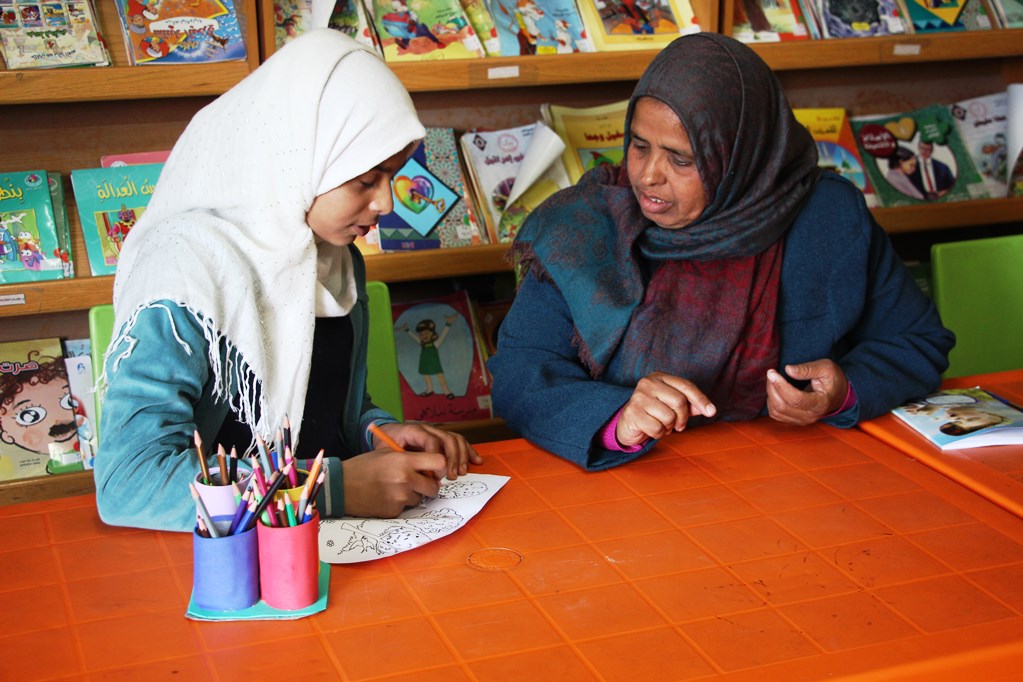
By: Raed Al Nims
Hundreds of women working at PRCS provide humanitarian and community-based services to Palestinians from all ages, thus creating success stories built on the power of their generosity. One such story is that of teacher ZeinabAbouShabab who works at the PRCS’ Rehabilitation Department in Khan Younes where she played a major role in the life of 13 year-old Malak Al Majaydah.
It all started when Malak’s school decided that Malak, who suffers from a mental and a speech disorder could no longer attend the school’s first grade because she couldn’t understand or absorb lessons like her peers. Malak’s father felt helpless and feared for his daughter’s future.He decided to seek help from the Society’s Rehabilitation Program in Khan Younes.
In 2010, Zeinab and a team from the Department assessed Malak’s case and found that she has poor comprehension skills, is aggressive, hyperactive and troubled. As a result, her learning capacity and speech are impaired. Zeinab took Malak under her wing and applied an intensive program which included integrating Malak with her healthy peers, implementing exercises to practice silence, and resorting to extracurricular tools such as games, drawing and group activities.
According to Zeinab, “because Malak was unable to comprehend and speak easily, she lacked self-confidence and feared society. She felt she was different from other kids. From the onset, we focused on building her self-confidence as well as her various abilities so she can play with, listen and talk to other children. We sometimes chose her to act as the children’s leader, so she wouldn’t feel marginalized".
She added: 'two years later, Malak’s comprehension improved: she started to make simple sentences, pronounce words clearly and hold more or less coherent conversations with her family. Once we achieved that, we were able to engage Malak in our educational program which included learning to read and write, teaching her personal hygiene and how to care for herself, enhancing her social skills by engaging her in PRCS’ activities as well as improving her motor, language and cognitive skills through computers, games and story-telling activities”.
At the end of 2014, the team sat down again to assess Malak’s situation. They found that Malak was now able to speak smoothly, read stories, draw and do some basic math calculations. As a result, Malak was enrolled in the third grade at the Rehabilitation Department’s school where she is taught the official Palestinian curriculum. Her comprehension skills are good and she is an active pupil. Zeinab’s eyes filled with tears as she spoke: “I cannot tell you how happy I am to see that Malak has regained her self-confidence and is now able to read and write. We have worked so hard to build her a better future, and we are now reaping the fruits of our labour”.
As for Malak’s father, he said: “we were very worried about Malak because of her aggressivity and inability to communicate. But today things have changed. I feel so happy when I hear her saying nice things to our guests or reading stories out loud. It is as if she’s making up for all her past silence and stuttering. This is all thanks to the efforts of her teacher and the Rehabilitation Department’s staff”.
I finally met Malak, and asked her about her experience with PRCS. She answered my questions in a sincere childish way, a little shyly: “They have taught me everything. I can now read and write and draw a house, a tree and a flower”. She looked at her teacher Zeinab then added: “I like to be with teacher Zeinab and my classmates at the Rehabilitation School. I have learned so much from them, and my dad is so happy now”.
This story of generosity and devotion comes as we celebrate the International Women’s Day (March 8th). It is our way of paying tribute to all women working with PRCS and to women all over the world.